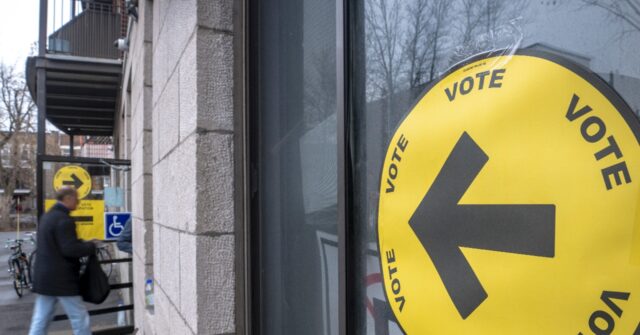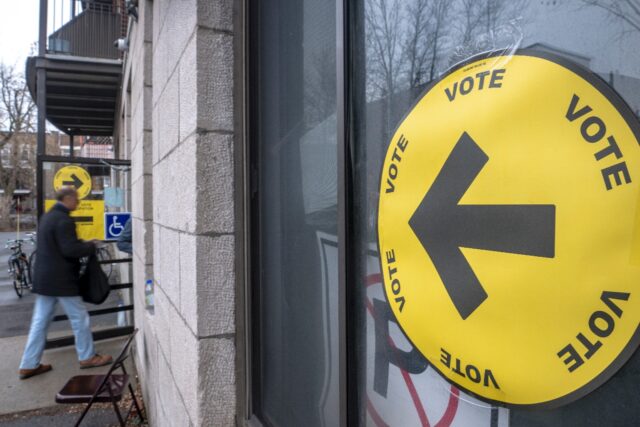-
Please be sure to read the rules and adhere to them. Some banned members have complained that they are not spammers. But they spammed us. Some even tried to redirect our members to other forums. Duh. Be smart. Read the rules and adhere to them and we will all get along just fine. Cheers. :beer: Link to the rules: https://www.forumsforums.com/threads/forum-rules-info.2974/
You are using an out of date browser. It may not display this or other websites correctly.
You should upgrade or use an alternative browser.
You should upgrade or use an alternative browser.
Canadian PM Debate ... Fatal Error by Carney? (VIDEO)
- Thread starter Melensdad
- Start date
I think Carney sunk his own ship right there in this debate.
Poiliever will win I think because of this.
I sure hope I am correct!
Poiliever will win I think because of this.
I sure hope I am correct!
NorthernRedneck
Well-known member
The whole thing was a laughable joke. We were watching it with my inlaws who are in town for the weekend. I agree that carney sunk his ship during the whole debate. He has the task of taking over 9yrs of Trudeaus bs which he was a part of. Every time he was challenged, he stumbled and had no response or plan. In fact, they all did that. Every one on that stage was in attack mode without any actual intelligent response. At one point I looked at my mother in law and said point blank, this election is like looking into a toilet bowl a d trying to pick out which one stinks the least. (As is with all elections IMO)
Carney had that "Deer in the headlights" look the entire debate.
Carney had that "Deer in the headlights" look the entire debate.
Look like Canadian "early voting" numbers are spiking.
Those of us watching from the bleacher seats have to ask, is this the Canucks equivalent of our Democratic Party's voter mobilization machine that flooded the ballot boxes with questionable ballots, or is this the silent majority getting out to oppose the organized tyranny organization made up of the liberal politicians, the censoring media and the compliant multi-national businesses that have been strangling the citizens?
It is generally presumed, at least in the American press, that a short Canadian election will favor the liberals in Canada for "more of the same" government.

 www.breitbart.com
www.breitbart.com
 AFPnormal
AFPnormal
Those of us watching from the bleacher seats have to ask, is this the Canucks equivalent of our Democratic Party's voter mobilization machine that flooded the ballot boxes with questionable ballots, or is this the silent majority getting out to oppose the organized tyranny organization made up of the liberal politicians, the censoring media and the compliant multi-national businesses that have been strangling the citizens?
It is generally presumed, at least in the American press, that a short Canadian election will favor the liberals in Canada for "more of the same" government.

High early voting numbers ahead of Canada election - Breitbart
Canada's election authority said Saturday that high early turnout was a sign of "enthusiasm for the ballot" in an election campaign overshadowed by
High early voting numbers ahead of Canada election
19 Apr 2025

Canada’s election authority said Saturday that high early turnout was a sign of “enthusiasm for the ballot” in an election campaign overshadowed by tensions with its American neighbor.
More than two million Canadians cast ballots on the first day of early voting Friday, according to initial Elections Canada data provided to AFP, a 36 percent increase from 2021.
Voters have until Monday evening to file early ballots ahead of the April 28 election.
On Friday, long queues formed outside polling stations in several large cities, with some people waiting up to two hours, local supervisors told AFP.
This year is a “special” election given “what’s going on with the United States,” said Josee Fournier outside a polling station in Montreal on Saturday.
The 60-year-old human resources worker said she had weighed her choice until the very last moment given the “serious” cross-border tensions.
Raphael Collomb, 35, said he had been “following all of the media and the candidates’ platforms” as he prepared to vote.
He wanted “the economy to do better and more peace and quiet for everyone,” he told AFP.
US President Donald Trump has issued a slew of threats to impose tariffs and undermine Canadian sovereignty since returning to office in January.
The perceived menace from abroad has prompted many Canadians to vote based on which party leader and prospective prime minister they think is best suited to stand up to Trump.
Recent polling puts the Liberals led by incumbent Mark Carney at around 44 percent support, leading the Conservative opposition under Pierre Poilievre at around 38 percent.
STORY CONTINUES AT THE LINK ABOVE ^^^
I know that Dr Jordan B Peterson, the Clinical and Academic professor from Canada, recently did a deep dive podcast into Carney and was very critical of his background. Basically said if you liked little Fidel Trudea, then you will love double-down Carney.
Then I ran across this article for the Canuckians to consider:
Then I ran across this article for the Canuckians to consider:
The Banker vs. the Politician: The Men Vying to Become Canada’s Next Prime Minister
The April 28 election will come down to two candidates with starkly different personalities and experience: Mark Carney and Pierre Poilievre.
When Canadians vote in parliamentary elections on April 28, they will essentially be choosing between two starkly different candidates to lead their country through a crisis brought on by President Trump’s tariffs and festering economic and social issues.
Mark Carney, 60, the Liberal Party leader who has been serving as prime minister since early March, is a political novice. He has had a long career in central banking and global finance.
Pierre Poilievre, 45, the Conservative Party leader, has been a politician for most of his adult life and is well known to voters, having meticulously curated his agenda, talking points and image.
Two other candidates are vying to maintain their parties’ representation in Parliament: Jagmeet Singh of the New Democrats, a leftist party that has focused much of its campaign on health care, and Yves-François Blanchet of the Bloc Québécois, which runs candidates only in Quebec. But Mr. Poilievre and Mr. Carney are widely acknowledged to be the only two who can gain enough support to become prime minister.
Mark Carney: The Banker
Mr. Carney is a former central banker who made his first foray into politics by winning the support of Liberal Party members to replace Justin Trudeau as the party’s leaderlast month.
In succeeding Mr. Trudeau, Mr. Carney became prime minister, in line with Canada’s parliamentary system. He has distinguished himself as a monetary policy-making and finance executive and is at ease in the high-power circles of the World Economic Forum at Davos.
His supporters mention this background as evidence of his deal-making competence and ability to move around power and money with ease; his critics cite the very same attributes as proof that he’s an out-of-touch elitist.
In the general election, he is running for a parliamentary seat in a middle-class neighborhood in Ottawa.
Mr. Carney was born in Fort Smith, in the Northwest Territories, and grew up playing hockey in Edmonton, Alberta. His parents were teachers. He is married to a British economist, Diana Fox Carney, and has four children. He was educated at Harvard and Oxford.
Framing his lack of experience in politics as an asset, Mr. Carney has presented himself as an outsider with a long record of public service and private-sector chops that make him the best person to stand up to Mr. Trump’s tariffs and annexation threats, and steady the country through economic tumult.
After a 13-year career in Goldman Sachs offices around the world, Mr. Carney moved to Ottawa to serve in the senior ranks of Canada’s finance department, and then as governor of the Bank of Canada from 2008 until 2013. In that role, he helped Canada avoid a financial crisis as the U.S. banking system melted down.
Mr. Carney led the Bank of England from 2013 until 2020, and tried to steady the British economy through Brexit.
He recently served as an adviser to Mr. Trudeau, a fact his detractors cite as evidence he is just Mr. Trudeau by another name.
Mr. Carney tends to speak deliberately and can come across as stiff or professorial. The rare interviews he has agreed to, including one last week with the Canadian cultural icon Nardwuar, have shown a lighter side.
Pierre Poilievre: The Politician
Mr. Poilievre has been involved in Conservative politics for two decades. At 24, he was Canada’s youngest member of Parliament in 2004, eventually becoming a cabinet minister under Stephen Harper, the Conservative prime minister who preceded Mr. Trudeau.
He has earned a reputation as a potent attack-dog politician on the party’s right who doesn’t shy from a fight and uses his sharp rhetoric and a disciplined performance to drill in his point.
As Conservative leader over the past three years, he has made his mark with three-word slogans, harvesting Canadians’ grievances with the stewardship of the country under Mr. Trudeau and the Liberal Party.
Like Mr. Carney, Mr. Poilievre grew up in Alberta and was raised by teachers, who adopted him from his mother, who had given birth to him at 16.
Mr. Poilievre’s wife, Anaida Poilievre, and their two young children have been prominent on the campaign trail, which has focused on crime deterrence, unaffordable living costs and buttressing Canada’s security, with promises to cut taxes and shrink government.
Up until January, Mr. Poilievre was considered a shoo-in to lead the Conservatives to victory in the federal elections and become the next prime minister. But things turned rapidly against him after Mr. Trudeau resigned, allowing Mr. Carney to appear as the shiny new face of the beleaguered Liberal Party.
And then came Mr. Trump’s election and his attacks on Canada’s sovereignty and economy.
Opinion research shows Mr. Poilievre has been harmed by comparisons to the American president. The two share a few pet sets of opinions — dislike for mainstream news media and big government, and support for cryptocurrencies and oil drilling. But what has mostly driven the comparisons has been Mr. Poilievre’s occasional use of harsh, pointed language.
Mr. Poilievre has been credited with “professionalizing” the Conservatives by formalizing the use of political consultants and voter-profiling methods, along with helping the party reach all-time fund-raising highs.
Looks like the ultra-short election cycle, and the relative unknown history of the unelected Carney is helping him and the Liberal Party in Canada. Combine that with Trumps trolling of the nation as a "state" and the nationalistic pride that has arisen in the the Liberal voters, and Carney, despite his double-down of unpopular/failed policies of Trudeau, remains in the lead.

 justthenews.com
justthenews.com
From John Solomons JUST THE NEWS FOUNDATION:

Canada’s conservatives see a reversal of fortune: Poilievre may miss what looked like a slam dunk
From a 92.5% chance of winning down to 23.3%: The ongoing tariff row between Canada and the United States, has allowed the Liberals to own the nationalist angle while Carney’s status as a fresh face has let him shed much of Trudeau’s far-left baggage.
From John Solomons JUST THE NEWS FOUNDATION:
Canada’s conservatives see a reversal of fortune: Poilievre may miss what looked like a slam dunk
From a 92.5% chance of winning down to 23.3%: The ongoing tariff row between Canada and the United States, has allowed the Liberals to own the nationalist angle while Carney’s status as a fresh face has let him shed much of Trudeau’s far-left baggage.
Before Canadian Prime Minister Justin Trudeau stepped down in favor of Mark Carney, Canada’s Conservative Party was expected to streamroll the national elections and overturn more than a decade of far-left liberal leadership. But under Pierre Poilievre, the Conservatives have seen their electoral prospects fall off a cliff as he has struggled to meet the moment and galvanize his supporters on a promise of tangible change.
Betting markets currently hand Carney a 76.6% chance of winning the election, to Poilievre’s 23.3%. The figure represents a stunning reversal from mid-January, when Poilievre was assigned a 92.5% chance of winning.
The Canadian Broadcast Corporation’s current polling shows Carney’s Liberal Party with 43.2% support, while Poilievre and the Conservatives trail with 38.0%. Canada is a multi-party parliamentary democracy that often sees other blocs gain seats in its legislature, though no other party is expected to seriously compete for the premiership.
Under CBC estimates, the Liberals have an 83% shot at an outright majority and a 13% shot at winning a plurality, while the Conservatives reportedly have a 2% chance of taking the most seats.
“I have never seen a transformation of our voter landscape in Canada of that nature,” pollster Frank Graves told Politico.
Adding to Poilievre’s own shortcomings is the ongoing tariff row between Canada and the United States, which has allowed the Liberals to own the nationalist angle while Carney’s status as a fresh face has let him shed much of Trudeau’s baggage. The Conservatives were the favorites to win as recently as mid-March. So why the massive flip? In short, Poilievre, Trump and immigration.
Trade war boosts Liberal Party chances
Since returning to the White House, President Donald Trump criticized the trade relationship between Ottawa and Washington, suggesting that the Canadians enjoyed unfair advantages due to dubious practices to undercut American markets.
“The dominant issue is, how do we negotiate future trade relationships with the United States and all those sorts of issues around tariffs,” Politico's Graves said. “And [Carney] has a very large advantage on that.”
While Trudeau was still in office, he traveled to Mar-a-Lago on a high-profile visit to address prospective tariffs. Trump later mocked Trudeau as the “governor of Canada,” leaning into his tounge-in-cheek rhetoric of making the country the 51st American state. Trudeau himself was widely lampooned in the Canadian media for seemingly surrendering his dignity to the American president.
After Trudeau resigned, however, Trump went further and announced reciprocal tariffs, which have seen Carney garner support for opposing them and triggered a nationalist Canadian response on the left to Trump himself. Trump's nominal ideological link to the Conservatives as a fellow politician on the right, moreover, appears to have hurt the party’s image, despite Poilievre’s own criticisms of Trump and the tariffs.
“It produced this really dramatic rise in national attachment, which is the main factor that propelled the Liberals to their elevated position,” Graves said of Trump’s goading.
Poilievre: “Moderate, reasonable levels of immigration”
Like many Western countries, Canada is struggling with an identity crisis amid mass immigration, notably from South Asian countries such as India and Bangladesh. Trudeau was comparable to President Joe Biden in allowing large numbers of migrants into the country.
The sheer volume of migrants contributed substantially to an ongoing housing shortage in Canada and, like in America, overwhelmed public services. Immigration ranked among the leading contributors to Trudeau’s decline in popularity.
Though the issue may have stoked considerable frustration in the electorate, the Conservatives struggled to harness voter discontent about immigration and were hesitant to lean into deportations in the way that Trump did while campaigning for the White House.
Poilievre has called for “moderate, reasonable levels of immigration” though he has made no commitment to specific immigration levels. In recent weeks, however, he has softened somewhat on the issue and issued statements more welcoming to immigrants, though that has come with some backlash.
"Bring your culture, bring your traditions, bring your family, but do not bring foreign conflicts onto our streets,” Poilievre said this month. The clip went viral, attracting millions of views and thousands of comments, nearly all of which condemned the soft stance on immigration.
Poilivre’s platitudes
Though the Canadian Conservative Party occupies the right side of the Canadian aisle, as one would expect, they are far from the ideological siblings of the MAGA-dominated Republicans in the United States. Rather, under its current leadership, the Conservatives more closely resemble the GOP of Mitt Romney and so-called “RINOS.”
Graves gave Poilievre credit for running a “disciplined campaign” but asserted he had not been able to pivot on his messaging in response to Trump, especially in light of a subset of his supporters liking the American president.
“They’ve tried a lot of things,” he said. “They’ve tried labeling Carney as another Trudeau. That’s not penetrating. They’ve tried going after him on an ethics issue. But in our testing on this stuff, they haven’t figured out a message that’s really resonating.” Poilievre used the approach of likening Carney to Trudeau as recently as Sunday, saying then that the only adjustments he made to the former prime minister’s platform were to “increase inflationary spending even higher.”
“Canada can't afford a 4th Liberal term of the same Liberals pushing higher taxes, higher spending, and higher inflation,” he posted.
The election is set for next Monday. Canadian law prohibits publication on Election Day of previously unreleased polls as well as the release of "exit polls" before all polling stations are closed.
Canada is f'ed. Their media is so tightly controlled by the Liberals. The people are sheeple.
